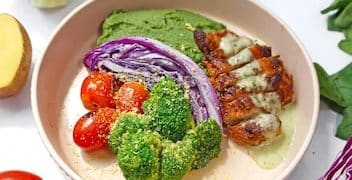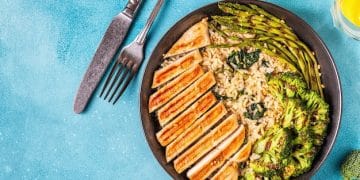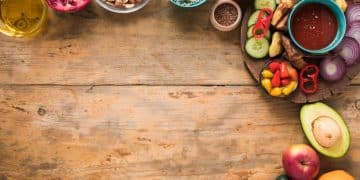Maximize Your Workout Results: Nutrition Strategies for 2025

Maximize your workout results in 2025 by strategically planning your pre- and post-workout nutrition, focusing on fueling for optimal performance and recovery with the right balance of macronutrients and hydration.
Ready to take your workouts to the next level? In 2025, optimizing your nutrition before and after exercise is more crucial than ever. Discover how strategic eating can enhance your performance and speed up recovery, ensuring you get the most out of every session. Let’s explore how to maximize your workout results: pre- and post-workout nutrition strategies for 2025.
Understanding Pre-Workout Nutrition
Pre-workout nutrition is all about fueling your body for the upcoming physical activity. It’s about providing the energy needed to perform at your best and delay fatigue. What you eat before a workout significantly influences your endurance, strength, and overall performance.
Timing is also crucial. Eating too close to your workout can cause discomfort, while waiting too long might leave you feeling sluggish. Finding the right balance will ensure you have enough energy without digestive issues.
The Importance of Carbohydrates
Carbohydrates are your body’s primary source of energy during high-intensity exercise. They are stored as glycogen in your muscles and liver, providing a readily available fuel source. Consuming carbohydrates before a workout helps maintain blood glucose levels, preventing fatigue and allowing you to push harder for longer.
Protein for Muscle Protection
While carbohydrates are the primary fuel, protein plays a vital role in protecting your muscles during exercise. It helps reduce muscle breakdown and supports muscle protein synthesis. Including a small amount of protein in your pre-workout meal can minimize muscle damage and kickstart the recovery process.
- Choose carbohydrates like whole grains, fruits, or oats for sustained energy.
- Include a small amount of protein, such as Greek yogurt or a protein shake.
- Ensure you eat 1-3 hours before your workout to allow for proper digestion.
In summary, pre-workout nutrition is about strategically fueling your body with the right balance of carbohydrates and protein. By timing your meals correctly and choosing appropriate foods, you can optimize your energy levels and protect your muscles during exercise.
Optimizing Your Pre-Workout Meal
Now that you understand the importance, let’s dive into practical examples of what to eat before a workout. The ideal pre-workout meal depends on the type of exercise you’re doing and how your body responds to different foods. Consider these options to tailor your nutrition to your specific needs.
Different types of exercises require different nutritional strategies. For example, endurance athletes might need more carbohydrates than someone doing a short, high-intensity workout.
Sample Pre-Workout Meals
Here are a few examples of pre-workout meals that provide a good balance of carbohydrates and protein:
- Oatmeal with berries and a scoop of protein powder provides sustained energy and essential amino acids for muscle support.
- A banana with peanut butter is a quick and convenient option, offering carbohydrates and healthy fats.
- Greek yogurt with fruit offers carbohydrates and a source of protein.
Timing Your Meal
The timing of your pre-workout meal can have a significant impact on your performance. As a general guideline, aim to eat 1-3 hours before your workout to allow for proper digestion and absorption of nutrients. Experiment to find what works best for you.
Ultimately, optimizing your pre-workout meal involves choosing the right foods, timing your meal appropriately, and staying hydrated. By customizing your nutrition to your specific needs, you can maximize your energy levels and performance, setting the stage for a successful workout.
The Science of Post-Workout Nutrition
Post-workout nutrition is crucial for recovery and muscle repair. After exercise, your body is in a state of depletion, and replenishing nutrients is essential to rebuild muscle tissues and restore energy stores. Understanding the science behind post-workout nutrition will help you make informed choices about what to eat.
The primary goals of post-workout nutrition are to replenish glycogen stores, reduce muscle breakdown, and promote muscle protein synthesis. Consuming the right nutrients can kickstart the recovery process and prepare you for your next workout.
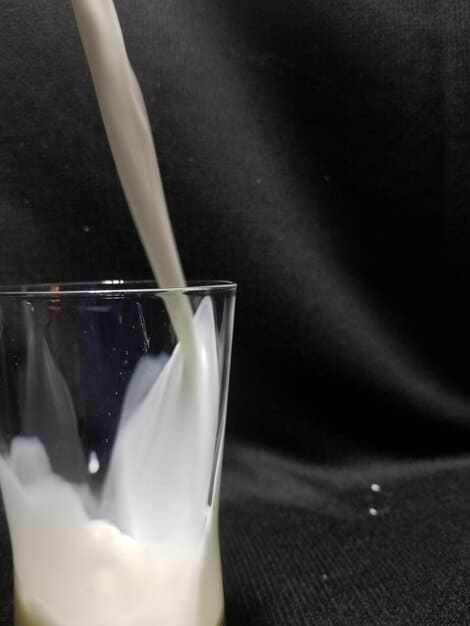
Replenishing Glycogen Stores
During exercise, your body uses glycogen as its primary fuel source. After an intense workout, your glycogen stores are depleted. Replenishing these stores is essential for energy recovery and preventing fatigue.
Repairing Muscle Damage
Exercise causes microscopic damage to muscle fibers. Protein is essential for repairing this damage and promoting muscle protein synthesis. Consuming protein after a workout provides your body with the amino acids needed to rebuild muscle tissues.
- Consume carbohydrates within 30-60 minutes post-workout to replenish glycogen stores.
- Include protein to repair muscle damage and promote muscle protein synthesis.
- Stay hydrated by drinking plenty of water or electrolyte-rich beverages.
In essence, post-workout nutrition is about providing your body with the nutrients it needs to recover, repair, and rebuild. By understanding the science behind post-workout nutrition, you can make informed choices about what to eat and optimize your recovery process.
What to Eat After Your Workout
Knowing what to eat after your workout can significantly impact your recovery and muscle growth. Let’s explore the best food choices to help you replenish glycogen stores and repair muscle damage. There are several options, each offering different nutritional benefits.
Timing is crucial. Aim to consume your post-workout meal or snack within 30-60 minutes after your workout to maximize nutrient absorption.
Ideal Post-Workout Foods
Here are some ideal post-workout food options:
- Protein shakes are a convenient way to consume protein quickly, aiding in muscle repair.
- Chicken or fish with rice or sweet potatoes offers protein and carbohydrates to replenish glycogen stores and repair muscle tissue.
- Greek yogurt with fruit provides a mix of protein and carbohydrates, promoting muscle recovery.
Hydration is Key
Don’t forget to stay hydrated. Dehydration can hinder recovery, so be sure to drink plenty of water or electrolyte-rich beverages after your workout. Electrolytes help replenish what’s lost through sweat and maintain proper fluid balance.
Post-workout nutrition is a crucial aspect of optimizing your fitness results. By choosing the right foods and hydrating adequately, you can support muscle recovery, replenish glycogen stores, and prepare your body for future workouts.
Advanced Nutrition Strategies for 2025
As we look ahead to 2025, advanced nutrition strategies are becoming increasingly popular among athletes and fitness enthusiasts. These strategies focus on personalized nutrition, supplementation, and timing to maximize performance and recovery. Exploring these advanced techniques can help you fine-tune your nutrition plan and achieve your fitness goals.
Personalized nutrition takes into account individual factors such as genetics, metabolism, and activity level. Supplements can help fill nutritional gaps, while strategic timing of nutrient intake can optimize performance and recovery.
Personalized Nutrition
Personalized nutrition involves tailoring your diet to your specific needs. This can be achieved through genetic testing, metabolic assessments, and tracking your body’s response to different foods. Understanding your unique nutritional needs allows you to optimize your diet for maximum results.
Supplementation
Supplements can play a crucial role in filling nutritional gaps and enhancing performance. Some popular supplements for athletes include creatine, beta-alanine, BCAAs, and omega-3 fatty acids. However, it’s essential to choose supplements wisely and consult with a healthcare professional before adding them to your routine.
- Consider personalized nutrition to tailor your diet to your specific needs.
- Explore supplements to fill nutritional gaps and enhance performance, but always consult with a healthcare professional.
- Experiment with nutrient timing to optimize performance and recovery.
Advanced nutrition strategies offer new ways to enhance your fitness results. By embracing personalized nutrition, strategic supplementation, and nutrient timing, you can optimize your diet and achieve your fitness goals more efficiently. As we move into 2025, these advanced techniques will become even more accessible and widespread.
Common Mistakes to Avoid
Even with the best intentions, it’s easy to make mistakes when it comes to pre- and post-workout nutrition. Avoiding these common pitfalls can help you maximize your results and prevent setbacks. Being aware of these mistakes ensures you’re getting the most out of your nutrition plan.
Skipping meals, not staying hydrated, and consuming the wrong types of foods can all hinder your progress. Let’s take a closer look at some common mistakes to avoid.
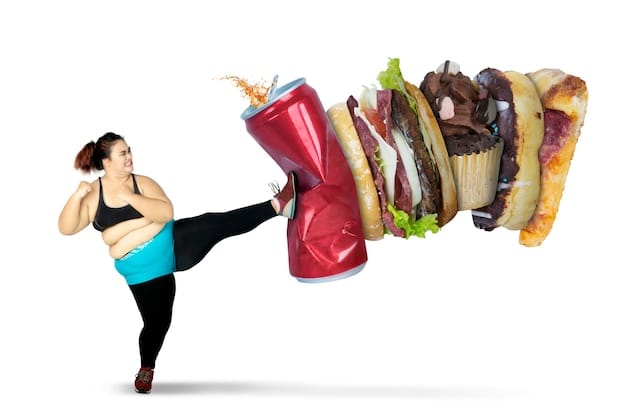
Skipping Meals
Skipping meals, especially before or after a workout, can sabotage your efforts. Your body needs fuel and nutrients to perform at its best and recover properly. Skipping meals can lead to fatigue, muscle breakdown, and poor recovery.
Not Staying Hydrated
Dehydration can significantly impact your performance and recovery. Aim to drink plenty of water before, during, and after your workout to maintain optimal hydration levels.
- Avoid skipping meals, especially before and after workouts, to ensure your body has the fuel and nutrients it needs.
- Stay hydrated by drinking plenty of water before, during, and after exercise.
- Choose whole, unprocessed foods over sugary or processed snacks to optimize your nutrition.
Avoiding these common mistakes can help you optimize your nutrition and achieve your fitness goals more effectively. By staying hydrated, eating balanced meals, and choosing the right foods, you can maximize your performance and speed up recovery.
Hydration Strategies for Enhanced Performance
Hydration is a cornerstone of athletic performance and recovery. Proper hydration ensures your body functions optimally during exercise, preventing fatigue and supporting muscle function. Understanding how to stay adequately hydrated can significantly enhance your workout results.
Dehydration can lead to decreased performance, muscle cramps, and impaired recovery. Maintaining proper hydration levels is essential for maximizing your fitness efforts.
The Importance of Water
Water plays a crucial role in many bodily functions, including regulating body temperature, transporting nutrients, and lubricating joints. During exercise, you lose fluids through sweat, making it essential to replenish these fluids.
Electrolytes for Performance
Electrolytes, such as sodium, potassium, and magnesium, are lost through sweat during exercise. These minerals are essential for nerve and muscle function, and replenishing them can help prevent muscle cramps and maintain performance.
- Drink water consistently throughout the day to stay adequately hydrated.
- Consider electrolyte-rich beverages during and after intense workouts to replenish lost minerals.
- Monitor your urine color to gauge your hydration levels: clear or light yellow urine indicates good hydration.
Proper hydration is a fundamental aspect of maximizing your workout results. By staying adequately hydrated and replenishing electrolytes, you can support optimal performance, prevent muscle cramps, and promote efficient recovery.
| Key Point | Brief Description |
|---|---|
| 💪 Pre-Workout Fuel | Carbs and protein for energy and muscle protection. |
| 🔄 Post-Workout Recovery | Replenish glycogen and repair muscle tissue. |
| 💧 Hydration | Drink water and electrolytes for performance and recovery. |
| 🚫 Avoid Mistakes | Don’t skip meals or consume processed foods. |
Frequently Asked Questions
▼
Opt for easily digestible carbohydrates like a banana or a small granola bar. These provide quick energy without causing stomach upset.
▼
Aim to eat within 30-60 minutes after your workout. This is when your muscles are most receptive to nutrient uptake.
▼
Not necessarily, but they are a convenient option. Whole foods like chicken or Greek yogurt can be just as effective.
▼
Electrolytes help maintain fluid balance and support muscle function. They’re especially important during intense workouts.
▼
Supplements can be beneficial, but they should complement a balanced diet. Consult with a healthcare professional before starting any new supplements.
Conclusion
Optimizing your pre- and post-workout nutrition is essential for maximizing your fitness results. By understanding the science behind fueling your body and implementing strategic nutrition strategies, you can enhance your performance, speed up recovery, and achieve your fitness goals more efficiently. As we look ahead to 2025, these nutrition principles will continue to play a crucial role in achieving peak athletic performance and overall well-being.

